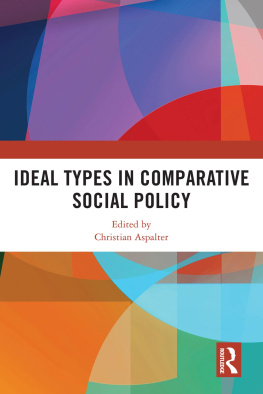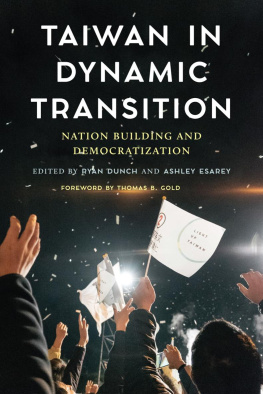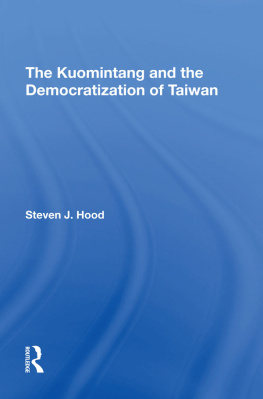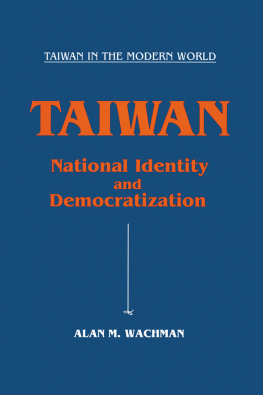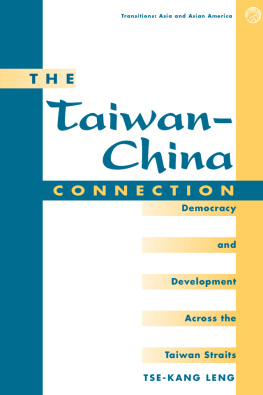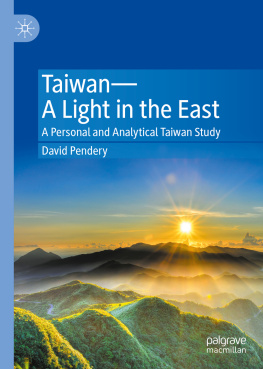Democratization and Welfare State Development in Taiwan
First published 2002 by Ashgate Publishing
Reissued 2019 by Routledge
2 Park Square, Milton Park, Abingdon, Oxon, OX14 4RN
52 Vanderbilt Avenue, New York, NY 10017
Routledge is an imprint of the Taylor & Francis Group, an informa business
Copyright Christian Aspalter 2002
All rights reserved. No part of this book may be reprinted or reproduced or utilised in any form or by any electronic, mechanical, or other means, now known or hereafter invented, including photocopying and recording, or in any information storage or retrieval system, without permission in writing from the publishers.
Notice:
Product or corporate names may be trademarks or registered trademarks, and are used only for identification and explanation without intent to infringe.
Publishers Note
The publisher has gone to great lengths to ensure the quality of this reprint but points out that some imperfections in the original copies may be apparent.
Disclaimer
The publisher has made every effort to trace copyright holders and welcomes correspondence from those they have been unable to contact.
A Library of Congress record exists under LC control number:
ISBN 13: 978-1-138-73181-3 (hbk)
ISBN 13: 978-1-315-18882-9 (ebk)
In reviewing the literature on Taiwan available in the 1990s, I noticed that Taiwan was not only excluded from the world community, but also to a large extent from the theoretical discourse on modernization in East Asia. Few international scholars have come to write excessively on Taiwan. Thus, the process of modernization in Taiwan never really came to the center of attention of academia in the Western world. Since it was impossible for the scope of this book to cover more than one particular colored stone in the kaleidoscope of modem Taiwan, I focused solely on the causal relationship of democratic competition of political parties and the extension of welfare state programs. Taiwan has so much to offer, especially for sociologists and political scientists who may test their theses easily at the background of a fast-running modernization process of society, a swift implementation of democracy and a mushrooming of civil society.
I am glad to have been able to live in Taiwan for such a long time, to meet and make friends with one of the friendliest peoples in the world. I had the chance to study Taiwanese people, their believes, cultures and democratic values first hand. Whenever I went out to carry out research, visiting friends or exploring the street life of Taipei, I had the chance to join numerous rallies and demonstrations. People there told me about their country, their happy and sad stories. From anti-radiation to pro-welfare demonstrations, from electioneering of Taiwans new small and minor parties to labor protests of communist and socialist labor unions; all facets of democratizing Taiwan in the 1990s were easily accessible for foreign students like me. The Mandarin that I have learned (over the years) in various coffee shops and McDonalds restaurants helped me a great deal in discovering all the facets of modem Taiwan. Taiwan, itself was and still is one of the greatest teachers a social scientist can wish for.
The number of people I would like to thank for having had the chance of meeting them is endless, but a few I have to mention: Prof. Lin Wan-I, Prof. Chan Hou-sheng, Prof. Bai Hsiu-hsiung and Prof. Chang Zhe-ming in particular who supported me during my studies as a Ph.D. student at the Department and Graduate Institute of Sociology at Taida. I also thank numerous experts and head of departments of various government institutions, especially from the Council of Labor Affairs, the Social Welfare Department of the Ministry of Interior, different departments of the Ministry of Economic Affairs, the Ministry of Finance, the Directorate General of Budget, Accounting and Statistics, and the Social Welfare Department of the Taipei City Government. Furthermore, I need to mention here the kind support dozens of scholars at universities and academic institutions from all over Taiwan. I have to be especially thankful to Prof. Lin Wan-I and Prof. Chan Hou-sheng from Taida, and Prof. Ku Yuen-wen and Prof. Chan Ying from National Chi Nan University in Puli for organizing social policy conferences of highest possible standards that I attended, which were very valuable for my research.
To cut short the list of those who supported me during my time in Taiwan is a pity, but not a crime. It is merely a necessity, since I dont know where to start and where to end. During the three years that I stayed in Taiwan in second half of the 1990s, I met hundreds of people who supported me. My memory is full of imposing feelings and impressions of my Taiwanese friends, who not only live for working, but who also enjoy the arts, their freedom, and their spare time to the highest degree. I wish all of them a prosperous and joyful life!
My new assignment to a teaching post in Taiwan, at Chaoyang University of Technology, will give me lots of new opportunities to meet my old friends and many new ones to come. I shall depart to Taichung soon, which gives me great pleasure. At this point, I can continue my personal task, i.e. to report and analyze Taiwans fast-changing societal and political developments, since I look forward to the day when the world comes to understand what Taiwan is all about!
Christian Aspalter
Hon. Lecturer
Dept. of Social Work and Social Administration
The University of Hong Kong
January, 2002
1
Introduction
The book examines the relationship between democracy and welfare state construction in Taiwan; especially the impact of democratic elections on the construction and extension of the Taiwanese welfare state system. The welfare state in East Asia, these days, is drawing for the first time the attention of a great audience. The issue of globalization - and, thus, the intensified competition between worldwide production sites with different levels of social standards - emerged as a central issue in the political discourse of a great number of developed Western countries that see their high levels of social welfare expenditures as a threat to future economic development in an increasingly interdependent world economy. The notion of social dumping in the rising economies of East Asia has found its way deep into the believe system of the common people and that of government officials in the West. But, in the 1990s, the author witnessed the very same discussions about and demonstrations against the relocation of factories to cheaper production sites out of the country in Taiwan; i.e. an identical development to that in Europe. In the case of Taiwan, these were and still are above all Mainland China, Vietnam, Thailand and Malaysia. In the West, the notion goes around that it are the Tiger states that take away the masses of jobs in the globalized world economy. This is far from being true. Nowadays, however, India, Mainland China, and most countries in Southeast Asia are much more attractive for international investments since their labor force is not only abundant, but also is a great deal cheaper in comparison. The Tiger states - after years of sustained high rates of economic growth due to their booming export-driven economy - now have become also comparatively expensive with regard to production costs of labor-intensive industries.



